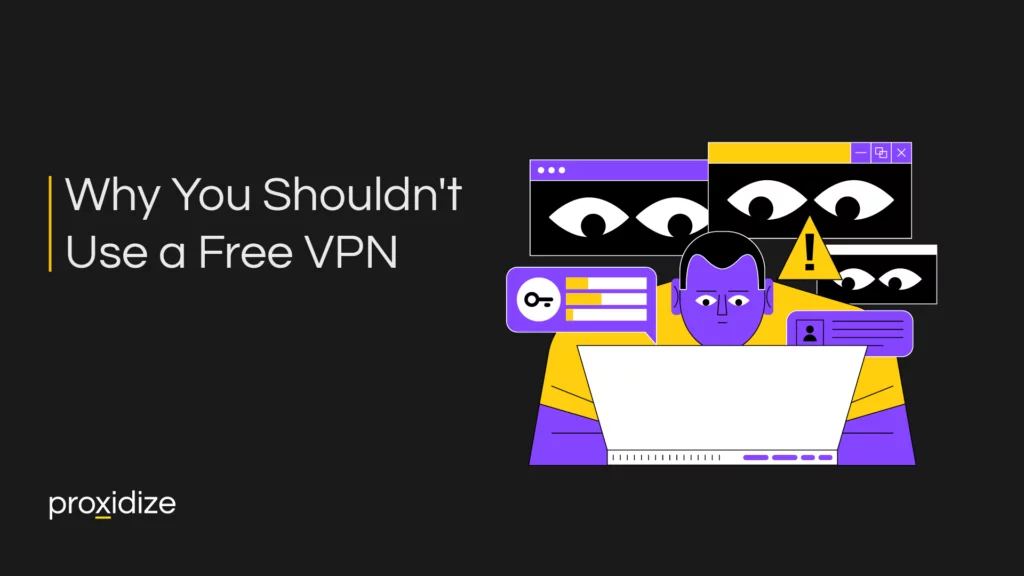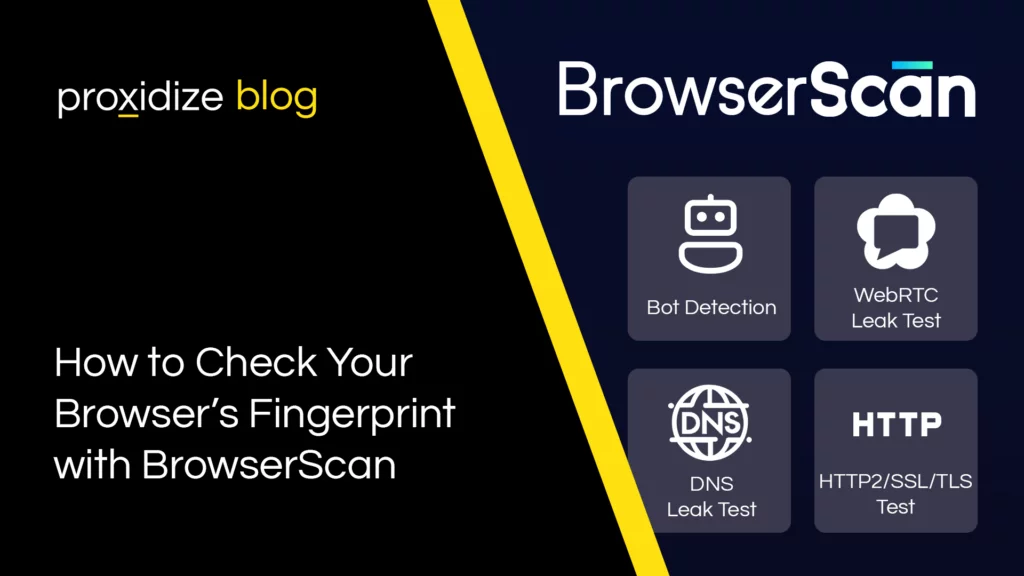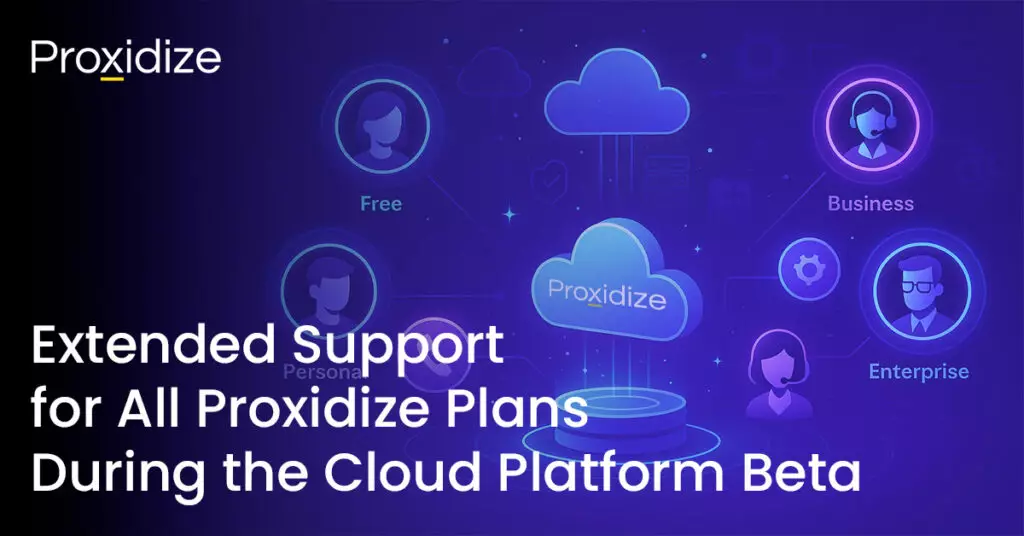Have you ever been tempted to use a free proxy to access websites that are blocked in your country or workplace? After all, it seems like a quick and easy solution to bypass geolocation restrictions, enhance your web scraping strategies, and protect your online privacy. But before you hit that “connect” button, there are some important things you need to know.
Using free proxies can do more harm than good. These services often come with hidden risks and drawbacks that can compromise your security and expose you to various threats. In this article, we’ll explain why using free proxies is a bad idea and what alternatives you can consider instead.
What Types of Proxies Are Free Proxies?
Free proxies are a type of proxy server that can be accessed by anyone and are used to conceal an internet user’s IP address. They have various use cases, including web scraping, geo-targeted advertising, verification, ticketing, and managing multiple accounts. These proxies typically originate from three main categories: public, mobile, and web-based proxies.
Public proxies, also known as open proxies, are free to use and are accessed by anyone. They are often hosted on hacked or compromised devices and can be used for malicious purposes. Public proxies are also notorious for being slow and unreliable, making them an unsuitable choice for anyone seeking security.
Mobile proxies are another type of free proxy that allows users to route their internet traffic through a mobile device. This type of proxy is usually faster than a public proxy list of servers but can be unreliable as they rely on the device’s battery life and connectivity.
Web-based proxies are similar to mobile proxies, but instead of routing traffic through a mobile device, they route traffic through a web server. These are usually provided by free proxy service websites and can be accessed directly through the website’s interface without the need for any additional software.
Proxies often utilize multiple hardware components to allow your request to reach the internet, In any case, there is always infrastructure needed between the proxy client and the network operator/internet. In the case of free proxies, providers are giving you access to this infrastructure for free but comes at the cost of your privacy.
Overall, while free proxies may seem like a good choice for those on a tight budget, they come with several risks and limitations. They offer little to no privacy or security and can be slow and unreliable, making them a poor choice for anyone seeking a reliable and secure internet connection.
How Mobile Proxies Work
Mobile proxies work by rerouting internet traffic through a mobile device, typically a smartphone or tablet. These proxies utilize a mobile’s data connection (3G, 4G, or 5G) to establish a link between the device and the desired website. They rely on third-party applications or configurations that enable the mobile device (proxy modem) to function as a proxy server.
When a user accesses a website or online service through a free mobile proxy, the requests are first sent to the proxy server through the proxy client. The server routes the request through the mobile proxy (modem) to the cell tower, which relays the request to the public internet using a masked IP address. In the case of the mobile proxies we build at Proxidize, the process is complete as shown below:
In order for a request to reach the internet using a mobile proxy, the user’s data needs to pass through multiple different hardware devices:
- The user’s proxy client (probably your own computer or smartphone)
- The proxy server (owned by the operator of the proxy service)
- The mobile devices (owned by the operator of the proxy service)
- The cell tower (owned by the network operator, like T-Mobile or AT&T)
How Web-Based Proxies Work:
A web-based proxy means that you’ll be able to access it solely from a web browser. The user enters their desired URL into the proxy website’s search bar. The web proxy sends a request to the target website’s content on the user’s behalf. The proxy’s server then fetches the target website and relays it to the user through the proxy website. Where the user will then be able to interact with the target website’s content.
How Public (Open) Proxies Work:
Free public proxies can be both residential and datacenter proxies, although datacenter proxies are more common in this category. When it comes to residential proxies, free options are relatively rare as they require access to a network of real residential devices, which incur costs for maintenance and operation. Residential proxies typically work by routing your internet traffic through these residential devices, making your requests appear as if they are coming from regular residential connections.
On the other hand, free public proxies that are datacenter-based work by routing your internet traffic through servers hosted in datacenters. These servers act as intermediaries between your device and the websites you visit, masking your IP. However, datacenter proxies are often more easily detected by websites or online services that employ anti-proxy measures.
Why Are Free Proxies Never a Good Option?
While the internet is flooded with thousands of free proxy providers, it is vital to understand the risks associated with using them. Free proxies lack encryption methods to secure your online data and come with hidden risks such as cookie theft and identity theft. In this section, we will discuss and justify why free proxies are never a good option and why opting for a secure alternative is crucial to safeguarding your online privacy.
Security Risks:
When considering proxy services, you may be tempted to opt for free options. After all, why pay for something if you can get it for free? However, using free proxies comes with a range of huge security risks that you should consider before, such as:
1. Data Loss
A significant factor that contributes to data loss when using free proxies is their unreliable nature. A free proxy usually operates on limited resources. As such, they tend to have slow speeds, consistent disconnections, and data packet losses. Therefore, data transmissions may be incomplete or corrupt, resulting in data loss.
2. Cookie & Identity Theft
Cookies are small files that websites store on your computer to remember your preferences and login information. They can also be used to track your browsing activity and build a profile of your interests. When you use a free proxy, the server can intercept and modify these cookies. Potentially giving them access to your login credentials and other sensitive information.
Identity theft is another serious risk of using free proxies. By intercepting your online activity, a proxy server can potentially steal your personal information, such as your name, address, credit card details, and whatever data that going through your connection.
This information can then be used to commit fraud or identity theft. I recently saw someone on Quora asking if free mobile proxies are safe to use for online banking. I would never recommend doing that because free proxy providers are rarely trustworthy.
3. Malware & Viruses
Hackers often use free proxies as a way to spread malware or viruses to unsuspecting users. They can inject malicious code into the proxy server, which then infects the computers of anyone who uses the proxy. In addition, some free proxies may be designed to infect your computer with malware or viruses. They may be disguised as legitimate proxies, but in reality, they are just a tool for hackers to gain access to your computer.
A great article from Christian Haschek’s blog about cyber security found that only 21% of Free Proxy Services are not shady, meaning that the other 79 % are. Most free proxies are not using an encrypted connection (HTTPS) when transmitting your data. Meaning that it is easier for scammers to steal your login details.
4. Illegal Use of Hardware:
One of the many reasons why you should never use a free proxy service is the illegal use of hardware. Free proxy services often use hacked or stolen hardware to provide their services. This means that your online activity is being routed through equipment that has been illegally obtained, which can lead to serious legal consequences for you.
Using a free proxy service that engages in illegal activities can also put your personal information at risk. These services may not have proper security measures in place, leaving your sensitive information vulnerable to hackers and cybercriminals.
Let’s look at the case of RSocks, a popular proxy provider that was recently seized by the FBI. They did not offer their proxies for free but for a remarkably low price. Wonder how they were able to get the prices down so low. Well, they used malware to install applications on the devices of random people, which turned those devices into proxy endpoints for their network. Many free proxy providers use the same or similar methods to bypass the cost of managing the required hardware.
Website of Proxy Provider that has been seized by the FBI
Poor Performance & Reliability Issues:
Another reason why you should never use a free proxy provider is their poor performance and unreliability. Free proxies often utilize overcrowded servers that are slow and experience frequent downtime. Therefore, they are a frustrating and time-consuming choice. Obviously, there is no customer service available, so finding someone who can help you will be an impossible task. Below are some factors that contribute to a free proxy server’s poor performance:
1. Slow Download Speeds & Connections:
A major drawback to using free proxies is the slow download speeds and connections that come along with them. This is because free proxies often have limited bandwidth and are shared among many users, which can significantly slow down your internet connection and make it difficult to access websites or download files quickly.
Furthermore, slow download speeds and connections can also pose security risks, as users may be tempted to turn off their proxy to access websites or download files more quickly, leaving their personal information and sensitive data vulnerable to hackers or other malicious actors.
2. Frequent Downtime & Service Outages:
Since free proxies are offered at no cost, they usually lack the necessary infrastructure and resources to create a reliable and consistent performance. As a result, users will experience regular service disruptions, frequent downtime periods, and persistent outages. There are two primary reasons behind this. First, free proxy services are often run by individuals or small organizations that lack the resources to maintain reliable and stable proxy servers. As such, these services aren’t designed to handle large numbers of users simultaneously.
Second, proxy providers offering free services will prioritize their paid customers. Therefore, they allocate fewer resources to their free offerings. Ultimately leading to server congestions, limited bandwidth, and insufficient maintenance. These service failures can range from temporary slowdowns to complete unavailability, making it challenging to rely on free proxies for consistent and uninterrupted internet access.
3. Limited Bandwidth
Most free proxy services have a cap on the amount of data transferred through them, severely limiting browsing speed. When the bandwidth limit is exceeded, the proxy may stop working altogether or require a waiting period until it can be used again. Furthermore, some free proxies may throttle your bandwidth. Even if the limit hasn’t been exceeded. As such, browsing speed could be slower than usual. Making it difficult to load websites or stream videos.
If you’re using a free proxy for business purposes, limited bandwidth can be especially problematic. It can slow down your workflow and make it difficult to communicate with clients or colleagues. In some cases, it could even lead to lost revenue or missed opportunities.
What Are Better Alternatives to Free Proxies?
If you wanna get the best service out of your proxy experience, then investing in a mobile proxy service provider is a must. However, we know that most proxy providers out there are quite expensive. At Proxidize, we are often talking to customers who were spending $200K+ a year on proxies ahead of joining us. With the final verdict being to steer clear of free proxies, what should one do?
The best, and most cost-friendly, alternative is to build your own mobile proxy network. This requires an upfront investment in the hardware, but it is up to 10x cheaper in terms of cost per month, quarterly, or year. Although you may think that you need a hefty amount of technical expertise to do that, with Proxidize, you can build your proxy network with no experience at all! Our expert team of developers will handle all the complex technicalities for you, all you have to do is connect all your hardware components together and have your proxy setup ready to go in only 30 minutes.
With Proxidize, you can rest assured knowing that you’re getting the highest quality and most secure performance. Given the fact that building your own mobile proxy setup will provide you with the utmost control and governance over your network. Therefore, there’s no need to deal with third-party providers to handle your mobile proxy network for you.
Additionally, you’re sure to experience improved speed, uninterrupted browsing sessions, and enhanced reliability. Due to our unlimited bandwidth, 24/7 customer assistance, and 99% server uptime. Lastly, free proxies, as well as proxy providers that only rent you their IPs, tend to have limitations in terms of customization features and functionality. Even paid proxies tend to charge you for the most basic of features or surprise you with a bigger tab due to some hidden costs. However, when operating your own network, you have full control over customizing IP and network settings, with no added charge.
Choose Security: Avoid Free Proxies
In conclusion, prioritizing security is paramount when it comes to online activities. Free proxies may seem appealing, but they come with significant risks that can compromise your sensitive information and expose you to cyber threats. To safeguard your privacy and protect yourself online, it is crucial to steer clear of free proxies. Instead, invest in reliable and secure solutions that prioritize data protection, like Proxidize. By choosing security over convenience, you can ensure a safer and more secure online experience. If you’re interested in building your very own mobile proxy network, contact our team today!







